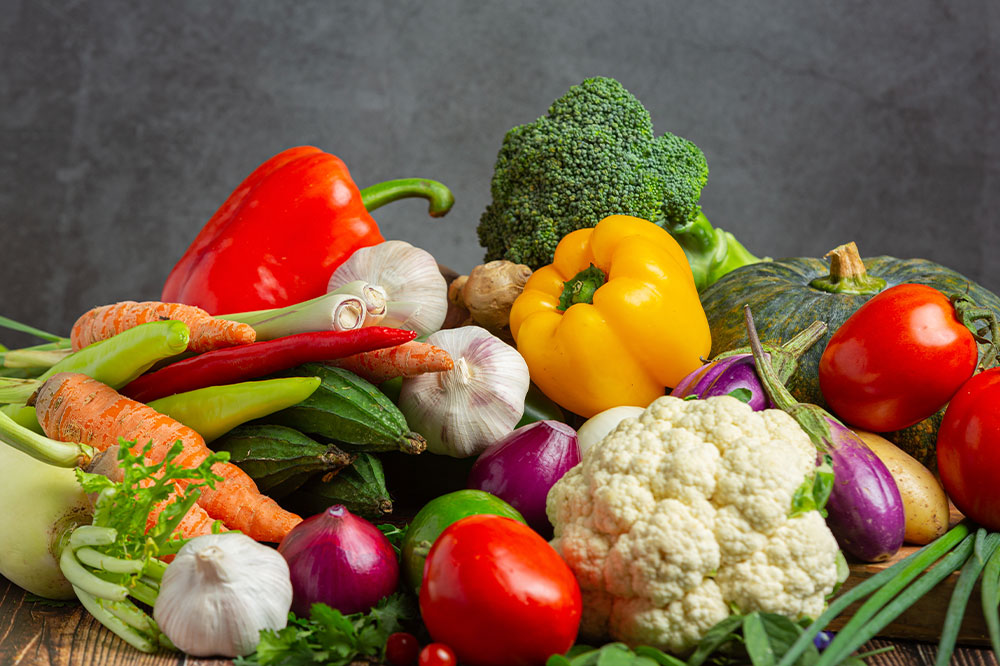
Managing Chronic Bronchitis with Lung-healthy Foods
Chronic bronchitis is a common condition that affects the lungs and causes inflammation, breathlessness, and coughing. It affects more than 11 million people in the country. This long-term condition can be managed with effective treatment and lifestyle changes. In addition, eating a healthy and balanced meal plan is one of the easiest and most effective ways to manage the symptoms of chronic bronchitis and reduce the risk of flare-ups.
Many foods can help reduce inflammation and support healthy lungs. Foods high in antioxidants, such as berries, citrus fruits, and leafy greens, can help reduce inflammation and boost the immune system. Eating plenty of fruits and vegetables can also help improve overall lung health.
Vegetables
The vegetables that are best to maintain a healthy pair of lungs are pumpkins, cabbage, red cabbage, Brussels sprouts, savoy cabbage, broccoli, broccolini, cauliflower, bok choy or Chinese cabbage, turnips, bell peppers, cayenne peppers, turmeric, beets, beet greens, tomato, onion, garlic, ginger, carrots, horseradish, radish, and daikon.
Doctors suggest eating a range of colorful vegetables is essential as the color pigments contain compounds suitable for the lungs and the whole body. The cruciferous vegetables such as cauliflower, broccoli, cabbage, and bok choy contain sulforaphane, essential in lung maintenance and function. The red bell peppers and cayenne flavonoids are among crucial minerals such as magnesium, potassium, and vitamin C. Tomatoes contain lycopene, carotenoid antioxidants that improve lung health and processes. In contrast, turmeric, ginger, and garlic are antioxidants and can help reduce inflammation.
Leafy greens
Including dark leafy greens in your daily meal plan can keep your lungs healthy. Some include kale, Siberian kale, tatsoi, wild arugula, watercress, mint, garden cress, collard greens, spinach, Japanese mustard spinach, and swiss chard.
These leafy greens contain iron, potassium, calcium, vitamin A, vitamin D, and carotenoids, crucial to reducing inflammation of the lungs as they have anti-inflammatory and antioxidant effects. Notably, the chlorophyll in the leafy greens improves blood flow throughout the body, especially to the respiratory system, enhancing lung health and increasing oxygen levels in the blood.
Fish and meats
Oily fish, such as salmon, trout, sardines, herring, anchovies, mackerel, and tuna, are excellent sources of vitamin A, vitamin D, and omega-3 fatty acids, which help reduce inflammation and support healthy lung function. In addition, lean meats, including chicken, pork loin, chicken liver, lean ground beef, and turkey, can also help improve lung health and increase immunity and strength.
Grains
Whole grains, such as oats, quinoa, barley, and brown rice, also benefit people with chronic bronchitis. These foods are fiber-rich, which can help reduce inflammation and improve overall health. Whole grains contain healthy fatty oils, vitamin E, and antioxidant flavonoids like selenium. Many studies suggest that whole grains also reduce the risk of lung cancer. In addition, nutritionists recommend switching from processed grains to whole grains to improve overall health, as whole grains have a higher glycemic index and antioxidant properties.
Fruits
The fruits that are good for the lungs are apples, oranges, berries such as blueberries, raspberries, cranberries, strawberries, oranges, tangerines, mandarins, grapes, grapefruit, pineapple, lemons, mangoes, apricots, prunes, and pomegranates. The berries contain anthocyanins, a type of antioxidant and one of the essential components that keeps the lungs healthy. The grapes and grapefruit contain flavonoids such as naringin, crucial in suppressing cancerous growths.
Citrus fruits such as oranges, tangerines, mandarins, and lemons are rich in vitamin C essential for overall lung health. Apart from vitamin C and naringin, these fruits are rich sources of vitamins A, B, K, folate, choline, magnesium, beta-carotene, potassium, phosphorus, calcium, iron, and zinc, all of which are essential for the smooth function of the lungs, and the overall respiratory system.
Seeds and nuts
Healthy seeds are mustard seeds, wasabi, canola, rapeseed, Ethiopian mustard, flax seeds, pumpkin seed, sunflower seeds, and all kinds of lentils. These seeds are rich in phytochemicals, including vitamins C, E, magnesium, and potassium, which boost the immune system and strengthen the lungs. Brazil nuts, hazelnuts, walnuts, pistachios, and cashews can also be included in one’s daily meal plan. While walnuts contain abundant omega-3 fats, Brazil nuts contain selenium, which is excellent for improving respiratory functions and enhancing the immune system.
All lentils contain polyphenols which have antioxidant and anti-inflammatory properties. However, recent studies suggest that lentils have lung-repairing and cleansing properties.
Understanding chronic bronchitis flare-ups
The exact cause of a flare-up is not always known, but there are specific triggers that can increase the risk of a flare-up. Common triggers include exposure to cold air, irritants like smoke or dust, and particular treatments. Stress, fatigue, and weather changes can also increase the flare-up risk.
Identifying and avoiding triggers is essential to reduce the risk of a flare-up. Keeping a diary to note your symptoms and possible triggers can help you identify what may be causing the flare-ups.
Foods to avoid with bronchitis flare-ups
Certain foods may worsen the symptoms of chronic bronchitis and increase the risk of a flare-up. Therefore, avoiding excessive intake of saturated fat foods, such as red meat, processed meats, and fried foods, is essential. These foods can increase inflammation and make it harder for the lungs to function properly.
Avoiding foods high in sugar, such as sweets and sugary drinks, is also essential. These foods can dangerously cause an increase in blood sugar levels, worsening inflammation and causing breathing difficulties.
Tips for managing bronchitis flare-ups
In addition to following a healthy, balanced meal plan, certain lifestyle changes can help manage chronic bronchitis and reduce the risk of a flare-up. In addition, regular exercise can help improve lung health and reduce inflammation.
Also, knowing your triggers and avoiding them can significantly improve your condition. These tips can help manage your chronic bronchitis and reduce the flare-up risk. In case of any questions or concerns about your condition, it is best to consult a doctor at the earliest.


